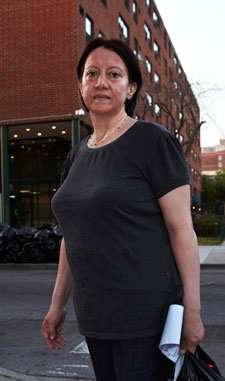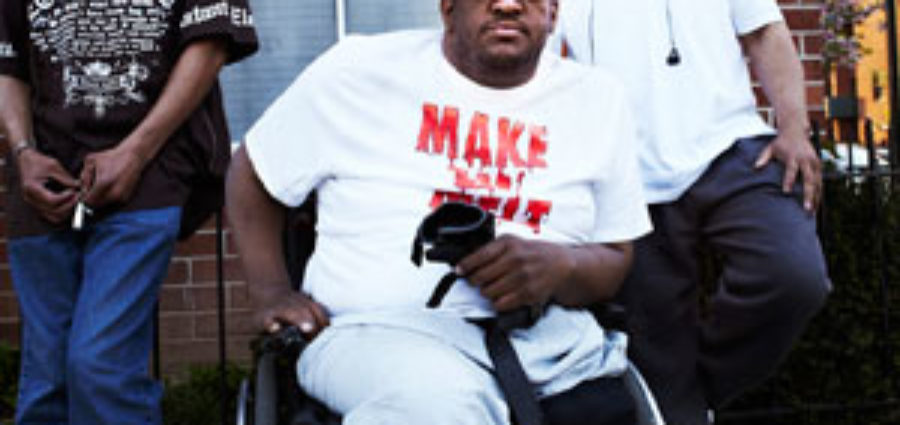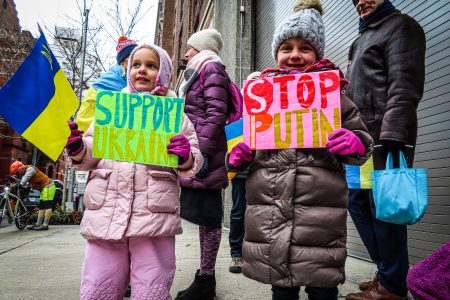WSWS reporters spoke with residents of the Melrose neighborhood of the South Bronx in New York City, where police harassment is pervasive. This overwhelmingly working class and minority area is among the city’s poorest areas, with the median household income barely reaching $20,000. The official poverty rate is 42 percent; official unemployment stands at 16 percent.

David, a resident of Melrose working as a nurse, gave a sense of the daily repression at the hands of the NYPD: “The police harassment happens every day around here. You see it all the time, especially with the young kids. Kids just walking in the neighborhood and getting stopped and harassed. And if you travel in groups of any more than two or three, then you’re definitely going to get stopped by the police.” He added, “It’s not just this neighborhood—you could go miles in any direction and the same thing is happening there.”
He recalled a recent but not uncommon occurrence in the neighborhood. “I came out of my building to go the store, and there was this young guy with pink headphones walking in front of me. I guess the cops didn’t like the look of him, and they started to harass him. I spoke up and told them that this guy is okay, he’s with me, just to get them to back off, but instead they got in my face asking me for my ID and proof of residence. One of the cops got on his cell phone to call for backup—not his walkie-talkie but his cell phone, so it wouldn’t be on record. The next thing you know, there are 10 more cops surrounding us on the sidewalk. I got out of that one somehow cause I had all the right ID.”
Melvin, a 50-year-old maintenance worker and lifelong resident of the neighborhood, was not so lucky in a recent encounter. “I went to the store and bought a hero,” he explained, matter-of-factly. “When I was coming out of the store, they searched me, frisked me. Then the cop just shook his head and took me in. I asked what I did, and he said I’d find out when I got to the station.”
Melvin said he spent an entire day, from 7:00 in the morning to 3:00 the following morning, locked in a jail cell. With nothing to charge him on, police evidently decided they had done all they could to him. “Then they just released me. I never saw a judge, never saw a lawyer, nothing,” he said. “You can’t just go around locking people up, frisking them, you know, like we aren’t human beings or anything.”
“If things keep going the way they’re going and there are no jobs,” Pee, a hospital worker, remarked, “I can see things happening like in the Book of Eli, or like a revolution or an uprising. People are just tired. There’s not enough jobs out there. There’s nothing for the kids to do. So when they don’t have jobs, what else are they going to resort to? Then you harass kids for just standing there. We’re not in a state where it’s martial law, but they act like that’s what it is.”
“The excuse they give is that it’s a drug area. Well, you can label any place a drug area. I think we’re profiled, since I don’t ever see it happening outside of people of color. It only happens in those neighborhoods. Especially since the young kids around here don’t know their rights,” Pee explained.
Referring to the tremendous divide in living conditions prevailing in New York, Ms. Maldonado, a resident of a neighboring building, remarked, “I go to Manhattan on the Upper East Side or the West Side—I’ve never seen them stop and frisk anyone. Not one kid, not one teenager, not one adult. I don’t see cops throwing them on the floor, kicking them. Everywhere else it’s like ‘tag, you’re it.’ ”
Ms. Maldonado’s son was recently stopped after they returned from a shopping trip. As he went into the convenience store to buy water, the cops stopped him and threw him against the wall. “When I came running over, they said they got a call matching his description. But when I demanded to hear the call to see if it was true, they stopped and just let him go,” she said.
The youth in the neighborhood are harassed all the time, “24/7,” Ms. Maldonado said. “You see kids in the park playing basketball or baseball. The cops will come down the strip and throw them on the floor, kick them, get their legs open, and frisk them, get in their pockets.”
One young worker who spoke with the WSWS explained his recent arrest. “I was coming home from school, just minding my own business,” P. explained. “As I was walking into my building, the police came inside and asked for ID. They asked if I was loitering, if I live here. They went in my pocket and found a little bit of weed. They took me to Central Booking and I wound up missing work the next day. Luckily, I had a few friends at work, but I could have lost my job.”
P. explained the intimidation present in the stops and frisks: “When they grab you up—two of them—you don’t want to fight with them. They got guns. They always win. It happens all the time. They’re the police, so they always win. You don’t want to end up like Amadou [Diallo] or Sean Bell.” Both were murdered by the NYPD.
Ms. Maldonado agreed. “People get scared, we don’t want to see the police guns in our face. They intimidate you. But I know if people were to get together and speak up, I know we could make a bigger change. Little people like us, that’s what makes the country.”
“We’re talking about a city where the big corporate guys are giving themselves bonuses of not millions, but tens of millions of dollars, and they say there’s no money for programs,” David said. “They won’t even loan us our own tax dollars back for local businesses. It’s all just blatant greed. For one man like Bloomberg to have billions of dollars and not give anything back to the city or the communities is almost hard to believe.
“It seems that there’s just nobody out here helping. This is an epidemic that’s been going on around here for a few decades but is definitely getting worse. It used to be that you work hard, and if you fall down, there’s somewhere to help pick you up again. The equation has changed, though, from all of the greed going on today.”








